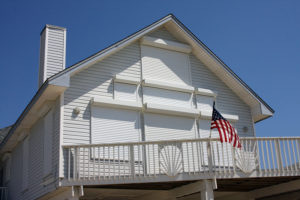
Storm shutters can help protect windows and doors from the impact of hurricane-force winds
With hurricane season in full swing, there’s no better time than the present to ensure that you’re well prepared. While we don’t get hurricanes where I live, we’ve all seen how much damage they can cause in places where they do hit, even hundreds of miles inland. Whether you plan to ride out the storms in your home or take refuge elsewhere, take the time to plan ahead so you’ll be ready if disaster strikes.
- Put together a storm kit. Add important supplies such as water, non-perishable food, and a first aid kit. The power is likely to go out, so you’ll also want to have a flashlight on hand with extra batteries, as well as a battery-operated or hand-crank radio.
- Protect windows and doors. If you live in an area that gets tropical storms, consider upgrades such as storm shutters or high-impact glass. Hurricane film can prevent glass from flying through your home, but it does little to stop the glass from breaking. Plywood is an effective and inexpensive option for protecting windows and doors before an approaching storm.
- Trim trees and discard dead branches. Property damage can be caused by falling trees and thrown landscape debris. Prepare your landscape by pruning trees to create an open canopy that lets wind flow through freely.
- Secure important documents in a waterproof place. Gather valuable documents such as birth and marriage certificates, passports, Social Security cards, home deeds, car titles, insurance policies, and health information. Store these documents in a safe, watertight container. Consider making electronic copies and saving them on a CD, DVD, or external drive as a backup.
- Strap down the roof. Your roof takes the brunt of the damage during a hurricane. If you are concerned about the integrity of your roof, consider using hurricane straps or clips to secure the roof to the frame of the house.
- Reinforce garage doors. Hurricane-strength winds can rip through your garage, causing hundreds or even thousands of dollars in damage. Minimize this risk by installing garage door braces before a storm.
- Secure loose outdoor items. If possible, bring things such as patio furniture, children’s toys, bicycles, and potted plants indoors. Heavier items such as vehicles, motorcycles, and boats should be brought into a garage or onto higher ground if possible.
- Fill up gas containers. If you plan on using a generator when the power goes out, you’ll need plenty of gas to keep it going. The average 5,500-watt generator will run about eight hours on 5 gallons of gas.
- Check your gutters for debris. Leaves, twigs, and such can cause clogs in your gutters that prevent water from flowing away from your home. Having clean gutters can help minimize water damage in heavy rains.
- Take an inventory of your possessions. It can be tough to remember everything that you had in your home after a hurricane hits. By having a written inventory of your belongings, you can get through the insurance claim process much faster.
